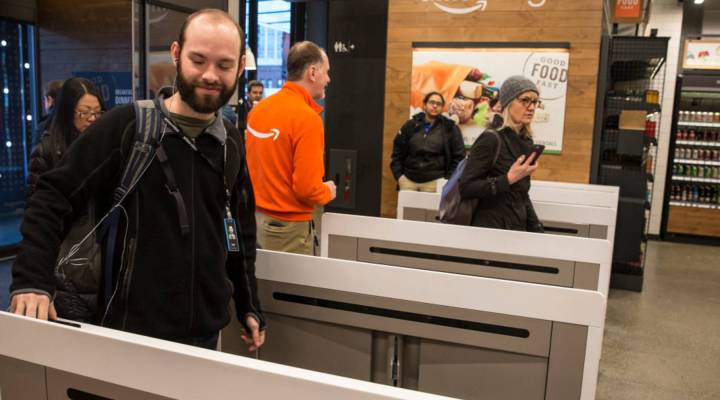
The convenience store of the future is always watching
The convenience store of the future is always watching

This week, Amazon opened its first automated, no checkout convenience store to the public. It’s called Amazon Go. Customers of the Seattle store download the Amazon Go app, and then put things like sandwiches or a banana — you know, things you buy in a convenience store — into their baskets. The company uses computer vision and sensors to monitor what people are taking, so there’s no line or checkout.
Amazon’s not the only retailer working on this — Walmart and Kroger are as well. But we are basically paying for that convenience by agreeing to be watched.
Marketplace Tech host Molly Wood talked about it with Joe Turow, author of the book “The Aisles Have Eyes: How Retailers Track Your Shopping, Strip Your Privacy, and Define Your Power.” An edited transcript of their conversation follows.

Cameras and sensors that track shoppers’ purchases line the ceiling of the Amazon Go in Seattle.
Molly Wood: In order to create this checkout-less future, what are the trade-offs?
Joe Turow: It really does signal a new wrinkle in the trend toward surveillance all around us. To my mind, this is the first supermarket I can think of where you actually cannot be anonymous. You walk in there, you have to be seen. I don’t know of any other modern large store where that’s the case. It harkens back to the 19th century where the peddler and the small store owner knew everybody coming in. Now that had its downsides, as well as its good sides. The downside is they could know who you are, stereotype you, charge you different prices depending upon what they knew you could afford. And, of course, it’s happening a lot today online. And while it’s probably not happening right now in the Amazon store — that is, differential pricing, differential treatment — I wouldn’t be surprised if that happens down the line.
Wood: What are the other dangers? What are the other downsides of this tracking aside from differential pricing?
Turow: Over time, the technologies that are being developed for marketers migrate to governments. The ways in which we accept surveillance in the marketing world means that we begin to see surveillance as natural. And that becomes a norm throughout society, whether it’s about government, whether it’s about schools — the upcoming generation is learning that the way to get along in the 21st century is to let companies and presumably government surveil you.
Wood: What do you do? How do you shop?
Turow: You know, a large percentage of Americans — we found 58 percent of Americans — are resigned about all this. And so I’m of that somewhat-resignation category. There are times I won’t give up my data. But in the end, to live in today’s world, you have to do this stuff. And you get punished if you are off the grid. I was giving a talk in Toronto last year, and a guy raised his hand — he looked like a mountain man. And he said, “You know, I have tried not to be in any databases, not to take out any kind of loans or anything like that. But recently, I had to take a loan out and I couldn’t get the loan.” So he was punished for essentially trying to keep off the grid.
Wood: Isn’t there some kind of middle ground between making it easier to check out and apps that track everything you do?
Turow: The name of the game today is tracking your purchases. That’s what it’s all about — figuring out what you buy, when you buy, how you buy, how long you actually will stand in front of a particular product before you decide whether to buy it or not. I was at an industry meeting about two years ago now where a consultant actually said that by 2024, half of Americans will have a chip in their arm as they walk through the aisle. The chip will tell the store how nervous that person is about the particular product he’s standing in front of and might change the price to make it more palatable. That sounds outlandish, but nobody in that meeting laughed. This is the new world we live in.
There’s a lot happening in the world. Through it all, Marketplace is here for you.
You rely on Marketplace to break down the world’s events and tell you how it affects you in a fact-based, approachable way. We rely on your financial support to keep making that possible.
Your donation today powers the independent journalism that you rely on. For just $5/month, you can help sustain Marketplace so we can keep reporting on the things that matter to you.












